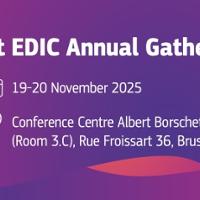Filter by topics
- All posts143
- Article10
- Brain Atlas6
- Brain Modes3
- Brain Modes App3
- Conference55
- Education42
- Event43
- Funding2
- Human Brain Project34
- Interview8
- LabMeeting2
- Network Neuroscience1
- OHBM1
- Open Science14
- Petra Ritter130
- Research9
- Seminar2
- The Virtual Brain64
- Video13
- WEBINAR17
- ebrains34
- exhibition9
- hbp1
- lecture13
- publication3
- workshop25
Read the latest posts
- 1st annual EDIC Gathering livestream recording now online!
- Lab End of Year Party 2025
- BRIDGE Project Launches
- Adopt AI (Paris)
Latest activities
-
1st annual EDIC Gathering livestream recording now online!
The recording of the [first annual EDIC Gathering livestream](https://digital-strategy.ec.europa.eu/en/events/first-annual-edic-gathering) is now online. You can find it [here](https://webcast.ec.europa.eu/edic-annual-gathering-event-2025-11-19). Dr. Petra Ritter introduced the TEF-Health EDIC concept as part of this event, check out the recording for more details! -
Lab End of Year Party 2025
The Brain Simulation Lab celebrated the end of 2025 together on a boat tour on the Spree here in Berlin. Gathered around the BBQ, we shared snacks and stories while watching the city sail past! We wish everyone a happy new year! -
BRIDGE Project Launches
We are excited to announce our participation in the EU-funded BRIDGE Project - a major European initiative to support innovative health technologies.
The EU-funded BRIDGE project (Breakthrough Regulatory Innovation and Development through sandbox Environments) officially begins its mission to deliver a framework for regulatory sandboxes for emerging health technologie
-
Adopt AI (Paris)
We are excited to share that Dr. Petra Ritter participated in a panel discussion at the recent Adopt AI International Summit in Paris at the iconic Grand Palais.
The panel, “Rethinking How We Regulate and Evaluate Health Technologies in the AI Era”, had an exceptional lineup of speakers: Saila Rinne (EU AI Office, European Commission), Prof. Hiroki Habuka (Kyoto University)and Francesca Colomb
-
3Sat NANO Talk: Data Medicine Revolution
Dr. Petra Ritter recently spoke on the German television program NANO Talk, about advances in data medicine. You can watch the program here. Dr Petra Ritter is featured at minute 25.
**D
-
Falling Walls Summit 2026
We are pleased to share that Dr Petra Ritter recently participated in the round table 'Supercharging Healthcare: AI, Data & Infrastructures' at the Falling Walls Summit in Berlin. The panel included Dr. Philipp Gerbert (CEO of TUM Venture Labs), Carsten Marr (Founding Director of the Institute of AI for Health at Helmholtz Munich), Peter Robinson (Alexander von Humbol
-
Dr Janek Stasinski: Successful PhD Thesis Defense
We are pleased to congratulate our former lab member Dr Janek Stasinski on the successful defense of his PhD thesis, ['Homeodynamic feedback inhibition control in whole-brain simulations'](https://journals.plos.org/ploscompbiol/article?id=10.1371/journal.pcbi.1012595). We wish him all the best in his new position at LANCH Food and Beverage Manufacturing.






